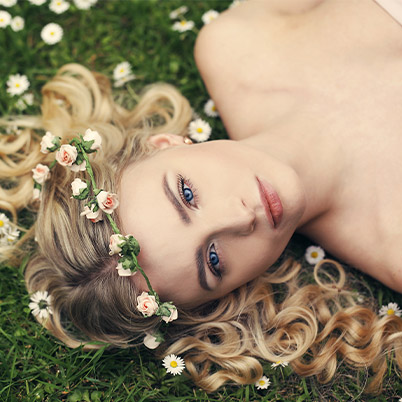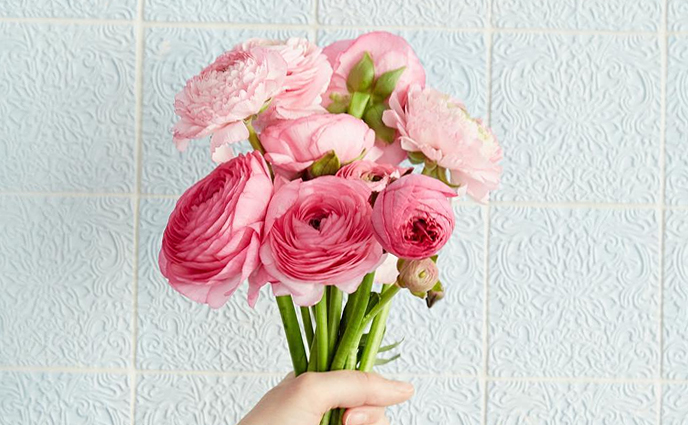You've definitely heard a lot about essential oils (thanks partially to brilliant multi-level marketing plans), but do you really know what they are? Does anybody know what they are? Sure, they smell great -- but what do they do?
"Essential oils give plants their smell," explains acupuncturist Elizabeth Trattner, DOM, who has trained under Andrew Weil, MD for 30 years. The oils are a concentrated distillation of the plant, and can be up to 100 times more potent than the plant itself, says Trattner.
Essential oils have been used in fragrances for years, but lately, they've scooted into the spotlight as a way to treat health issues. Diffused, inhaled, ingested or applied topically, some studies suggest that essential oils really can have healing powers -- potentially.
But not all essential oils are created equal. According to Rupinder Mangat, founder of luxury essential oil brand Mevei, these are the things to watch out for:
-Don't be fooled by labels like "therapeutic grade." Mangat says there is no such generally accepted definition of the term in the industry, nor any organization that grades or certifies essential oils.
-Other terms that don't mean anything include: "medicinal grade," "certified pure," "aromatherapy grade," etc.
-Look for ISO-approved oils. ISO stands for International Organization for Standardization, which is an independent organization in Switzerland that provides standards for packaging, conditioning, storage and manufacturing.
-Smell the oil and dot it on a tissue. Mangat says there should be no trace of an alcohol smell and no residue.
-Watch out for essential oils labeled "nature identical," which are synthetic and don't include important trace chemicals found in the plant version.
-Price is an indicator of quality, says Mangat. A cheap essential oil from discount retailers is "not pure, guaranteed," she says. Real essential oils are expensive.
Here, the best essential oils to treat whatever ails you. But first, a word of warning: Essential oils are not meant to be applied topically without a carrier oil or some form of dilution. "I have witnessed so many patients who have had allergic reactions to it when put directly on skin, scalps, and nails," says Trattner. She says the best way to get the aromatherapy benefits of oils is to put a few drops in a diffuser or a bowl of hot water.
Image via Getty
"Essential oils give plants their smell," explains acupuncturist Elizabeth Trattner, DOM, who has trained under Andrew Weil, MD for 30 years. The oils are a concentrated distillation of the plant, and can be up to 100 times more potent than the plant itself, says Trattner.
Essential oils have been used in fragrances for years, but lately, they've scooted into the spotlight as a way to treat health issues. Diffused, inhaled, ingested or applied topically, some studies suggest that essential oils really can have healing powers -- potentially.
But not all essential oils are created equal. According to Rupinder Mangat, founder of luxury essential oil brand Mevei, these are the things to watch out for:
-Don't be fooled by labels like "therapeutic grade." Mangat says there is no such generally accepted definition of the term in the industry, nor any organization that grades or certifies essential oils.
-Other terms that don't mean anything include: "medicinal grade," "certified pure," "aromatherapy grade," etc.
-Look for ISO-approved oils. ISO stands for International Organization for Standardization, which is an independent organization in Switzerland that provides standards for packaging, conditioning, storage and manufacturing.
-Smell the oil and dot it on a tissue. Mangat says there should be no trace of an alcohol smell and no residue.
-Watch out for essential oils labeled "nature identical," which are synthetic and don't include important trace chemicals found in the plant version.
-Price is an indicator of quality, says Mangat. A cheap essential oil from discount retailers is "not pure, guaranteed," she says. Real essential oils are expensive.
Here, the best essential oils to treat whatever ails you. But first, a word of warning: Essential oils are not meant to be applied topically without a carrier oil or some form of dilution. "I have witnessed so many patients who have had allergic reactions to it when put directly on skin, scalps, and nails," says Trattner. She says the best way to get the aromatherapy benefits of oils is to put a few drops in a diffuser or a bowl of hot water.
Image via Getty
Essential oil: Blue Chamomile
Trouble sleeping? Add blue chamomile to your nightly routine. It's no secret that chamomile is calming when ingested or applied. The scent can also have lullaby-like qualities -- in one study, inhaling the vapor reduced stress-induced release of adrenaline hormones.
Dropped into a diffuser like the Saje Natural Wellness AromaTime Ultrasonic Diffuser, which can be programmed to run for six hours, you can be sure of a restful night's sleep.
Image via Getty
Trouble sleeping? Add blue chamomile to your nightly routine. It's no secret that chamomile is calming when ingested or applied. The scent can also have lullaby-like qualities -- in one study, inhaling the vapor reduced stress-induced release of adrenaline hormones.
Dropped into a diffuser like the Saje Natural Wellness AromaTime Ultrasonic Diffuser, which can be programmed to run for six hours, you can be sure of a restful night's sleep.
Image via Getty
Essential oil: Lavender
Trattner calls lavender an essential oil "superstar." The list of healing properties is long, and includes addressing issues like headaches, lice, cysts, muscle pain, digestive issues, depression, nervousness and many other mood disorders, says Trattner. As the subject of over 350 PubMed studies, researchers clearly think it's worth being evaluated. A tip for relaxation: "I put a few drops mixed with clary sage, geranium and ylang ylang in a spray bottle of distilled water," says Trattner, which mimics her favorite aromatherapy scent, Clear Skies Ahead by Little Moon Essentials, $6.30. It's also a way to make expensive essential oils go a long way.
Image via Getty
Trattner calls lavender an essential oil "superstar." The list of healing properties is long, and includes addressing issues like headaches, lice, cysts, muscle pain, digestive issues, depression, nervousness and many other mood disorders, says Trattner. As the subject of over 350 PubMed studies, researchers clearly think it's worth being evaluated. A tip for relaxation: "I put a few drops mixed with clary sage, geranium and ylang ylang in a spray bottle of distilled water," says Trattner, which mimics her favorite aromatherapy scent, Clear Skies Ahead by Little Moon Essentials, $6.30. It's also a way to make expensive essential oils go a long way.
Image via Getty
Essential oil: Rosemary
In one study, a low dose of rosemary was found to have positive effect on cognition of elderly adults. Since we're into anything that can help us remember what day it is, consider us sold. Fun fact: Rosemary was burned in French hospitals to purify the air until the 1900s. Rosemary -- it's so vogue of you.
Image via Getty
In one study, a low dose of rosemary was found to have positive effect on cognition of elderly adults. Since we're into anything that can help us remember what day it is, consider us sold. Fun fact: Rosemary was burned in French hospitals to purify the air until the 1900s. Rosemary -- it's so vogue of you.
Image via Getty
Essential oil: Peppermint
In a diffuser, peppermint essential oil can be used to help with headaches and fatigue, says Trattner. Applied topically (mixed with a carrier oil, remember!) peppermint has been shown in studies to be as effective as pain relievers.
Image via Getty
In a diffuser, peppermint essential oil can be used to help with headaches and fatigue, says Trattner. Applied topically (mixed with a carrier oil, remember!) peppermint has been shown in studies to be as effective as pain relievers.
Image via Getty





